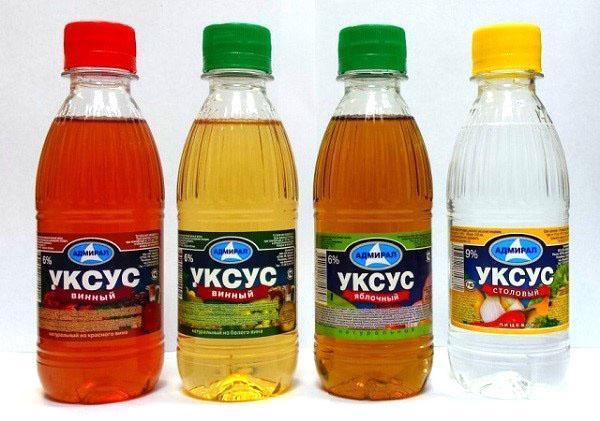Choosing the right and quality vinegar
 Every housewife knows: if a can with preservation exploded, most often the reason for this is poor-quality vinegar. Some dishonest manufacturers seek to modify the composition of the product in order to get as much as possible at the lowest cost. How not to fall for their bait and buy real, high-quality vinegar? Indeed, sometimes not only the taste of the dish depends on this, but also the health of family members.
Every housewife knows: if a can with preservation exploded, most often the reason for this is poor-quality vinegar. Some dishonest manufacturers seek to modify the composition of the product in order to get as much as possible at the lowest cost. How not to fall for their bait and buy real, high-quality vinegar? Indeed, sometimes not only the taste of the dish depends on this, but also the health of family members.
Read also the article in the topic: apple cider vinegar - health benefits and harms!
Types of vinegar
To begin with, it is worth noting that there are several types of vinegar and each of them has its own purpose and application.
Vinegar can be:
- Natural... In its production, grape and fruit wine is used, which is fermented twice. Acetic bacteria begin the natural fermentation process and convert alcohol under the influence of oxygen into vinegar.
- Synthetic... It is made based on mineral fertilizers with natural gas or oil. The acetic acid obtained as a result of chemical reactions is diluted to a 6-, 9- or 12-% solution. It is marketed under the name "table vinegar", but this product does not contain anything useful. It is, first of all, a preservative (chemical additive) and should only be used for conservation.
Synthetic vinegar is not recommended for adding to food.
How to choose quality natural vinegar?
In natural vinegar, the percentage of acid is never higher than 9. In order not to be mistaken and not to buy synthetic vinegar instead, you need to pay attention to the following points:
- the label must say "natural" or "alcoholic" or the name of the product from which it was made (apple, grape);
- natural vinegar cannot contain synthetic acetic acid, flavors and dyes - if they are indicated on the label, this is synthetic vinegar, tinted.
Since natural vinegar is made from natural ingredients, all their beneficial vitamins and trace elements remain in it.
How to identify fake synthetic vinegar?
The reason for the explosion of conservation is the fake vinegar. In the hot summer-autumn period, when vegetables and fruits ripen, some unscrupulous producers deliberately reduce the amount of acetic acid in vinegar. So instead of 9% vinegar, you can buy 6% concentrate, but under the first name. Since this amount of acid is not enough to fight bacteria, the jars explode.
In the event that there is a doubt about the manufacturer and the information indicated on the packaging, you can check the quality of the vinegar by shaking the bottle. Good vinegar will keep the foam for no more than 5 seconds, and if it does not disappear for a long time, the product contains more water and less acid.
Regardless of what kind of vinegar was purchased and for what purpose, it is better to buy a synthetic and natural product in glass bottles or pour it immediately. The first product has a very long shelf life, but natural vinegar loses its beneficial properties after a year.